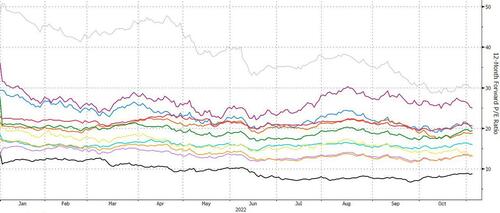Energy Is Still A Bargain Even After 65% Rally
By Tatiana Darie, Bloomberg Markets Live reporter and analyst
As stock-picking gains importance in a tough macro environment for markets, energy stands out as the S&P 500 Index’s cheapest sector, despite its massive rally this year.
Omega Advisors CEO Leon Cooperman is right: Energy stocks are still cheap, by one measure at least. That’s even after the sector gained roughly 65% this year, making it the only S&P 500 segment in the green YTD.
Remarkably, energy commands the lowest multiple among major sectors in the index despite oil companies posting some of their largest profits in history. The S&P 500 Energy index’s 12-month forward price-to-earnings ratio as of Wednesday’s close was 8.7, roughly half the other 10 sectors’ average forward multiple of nearly 19 and less than a third of the most expensive sector by this metric — real estate — which has a multiple of 30.
And while we’re not technically in a recession, what’s even more surprising is how energy’s current valuation based on forward earnings compares with past economic downturns. Controlling for the stratospheric jump in 2020 (when oil prices turned negative), the average median forward P/E ratio seen in the past four downturns is 14, based on weekly data going back to 1990.
What gives? First, earnings more than doubled this year, so the 65% increase in share price has actually lagged. It’s what comes next that’s concerning investors. After a bumper year in 2022, energy is expected to lead earnings growth declines for both 2023 and 2024 as global economies slow, according to Bloomberg Intelligence data.
Political pressure remains a threat but President Biden’s vow to slap a tax on oil-company profits is seen as more bark than bite ahead of the midterms.
And of course, there’s the rise of ESG, which is here to stay despite a cooling in investment interest in recent months. It’s just become a bit harder to prioritize green goals in such a volatile environment when energy’s the only thing that’s worked this year
Also, not to be ignored is that by measures such as price-to-book, the industry screens as the most expensive in more than a decade, BI analyst Gillian Wolff points out. That’s likely due to a lack of capital investment in physical assets that is eroding their book value as equipment depreciates, she said.
BI’s scorecard still favors energy as the top sector into year-end, nonetheless. Even though earnings growth is projected to slow, analysts have raised forward-four-quarter EPS estimates for a majority of companies in the sector, analysts wrote. Annual comparisons will also be tough next year so growth deceleration should be taken with a grain of salt.
The sector enjoys robust momentum and Brent crude is hovering close to $100/barrel. A potential reopening in China, around which speculation has swirled lately, would be a big boost to demand. Add it all up, and there’s likely still some room for energy to run.
Tyler Durden
Fri, 11/04/2022 – 15:06

